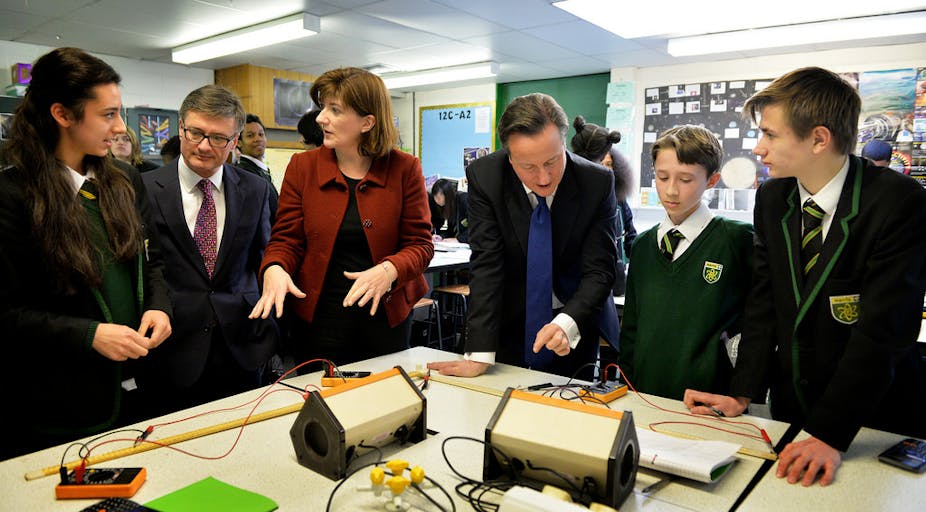Those who have agitated for subject knowledge, rather than skills, to be the focus of the national curriculum, may have been pleased to hear the secretary of state for education, Nicky Morgan, following in her predecessor Michael Gove’s footsteps in a recent speech at the think tank Politeia.
Morgan said that the government’s education reforms have at their heart “a determination to place knowledge back at the core of what pupils learn in school” over the previously prioritised “development of skills”. She said that “it’s impossible for young people to gain the skills and attributes that we all prize, without the knowledge base to put those skills into action”. She went on to argue: “A rich corpus of knowledge should be the equal right of every child.”
Some may question her commitment to that, as the head of a department that just last year announced it was dropping the knowledge-rich International GCSEs – IGCSEs – from its league tables, effectively leaving them as a resource for independent schools. That move has now caused anger at those independent schools who appear to have slipped down league tables as a result.
Winning the argument for knowledge
It’s true that the new national curriculum has more knowledge in it, put in by people committed to subject-based education – where teachers are experts in their subjects and use this as the bedrock of their teaching, rather than focusing on children’s soft skills.
Morgan may also have been thinking about Pimlico Academy, the West London Free School and the East London Science School – all excellent examples of knowledge-based schools.
The problem is you can’t just say that knowledge is important. You have to win the argument for knowledge. Morgan fails to do that because she is still thinking about knowledge in a way that those who “prized the development of skills” such as the New Labour government always did. That administration was obsessed with skills policies.
She thinks about knowledge as instrumental – as important for some other reason, such as trying to create greater social mobility. Yet knowledge doesn’t “matter” in the way she presents the case for it. Knowledge is an end in itself.
Not part of a social engineering project
I would argue that knowledge is not something we value, it is a value. It also carries with it a range of other epistemological values including freedom of speech, honesty, consistency, and the constant questioning of assumptions that are the foundation of knowledge. These are not external values imposed from the outside, but are values internal to the pursuit of knowledge. These values do not have to be taught separately. They are integral to the pursuit of knowledge for its own sake.
You can’t win the argument for knowledge if, like Morgan and many others who formally support a knowledge-based curriculum, you support it because it will do some social engineering in the name of “fairness and social justice”. Morgan is capitulating to the skills argument by saying we will get the skills we need if children have knowledge.
She wants to help the disadvantaged and underachieving by giving them knowledge. In this way, she hopes to increase social mobility. She wants to produce well-rounded children, develop character and support what she considers to be the core “British values” of “democracy, the rule of law, individual liberty, tolerance and respect”. Even “freedom of speech” gets a mention as a “British value” at the end of her speech.
Moral leadership?
The authoritarian tone is clearly there – no school will be exempt from imposing whatever the government determines is a “British” value. In this speech Morgan moves from a defence of knowledge to the imposition of values in order to regain “moral” leadership.
The argument about what constitute “British values” is already turning into a bitter and confusing one. Morgan needn’t have gotten into it if she really understood what knowledge is: a universal value that has been the basis of all great cultures. In ancient Greece, Islamic countries at their highest point, and in Enlightenment Europe, the desire for knowledge was the over-riding value.
The philosopher Immanuel Kant said the motto of the Enlightenment was “Sapere aude – Dare to know!” and he started his famous essay “What is Enlightenment?” with this powerful statement:
Enlightenment is man’s emergence from his self-imposed nonage. Nonage is the inability to use one’s own understanding without another’s guidance.
Teachers and pupils do not need government guidance about how to live – they need a real commitment to knowledge. All of the other social engineering initiatives, especially the requirement to teach “British values” will be counter-productive and will take away the emphasis on knowledge.
If Morgan really wanted to undo the infantilisation of the teaching profession and ensure that a knowledge-based curriculum was possible for every pupil, she should adopt Kant’s motto and simply say to them: “Dare to know!”

